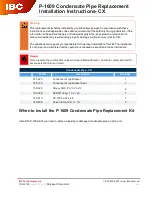
16
Installation & Operation Manual
3
General venting
PVC/CPVC Vent piping materials
Use only the materials listed in Table 3A for
vent pipe, and fittings. Failure to comply
could result in severe personal injury, death,
or substantial property damage.
Installation must comply with local
requirements and with the National Fuel Gas
Code, ANSI Z223.1 for U.S. installations or
CSA B149.1 for Canadian installations.
Install vent and combustion air piping
DANGER
The Knight wall mount boiler must be
vented and supplied with combustion and
ventilation air as described in this section.
Ensure the vent and air piping and the
combustion air supply comply with these
instructions regarding vent system, air
system, and combustion air quality. See also
Section 1 of this manual.
Inspect finished vent and air piping
thoroughly to ensure all are airtight and
comply with the instructions provided and
with all requirements of applicable codes.
Failure to provide a properly installed vent
and air system will cause severe personal
injury or death.
All PVC vent pipes must be glued, properly
supported, and the exhaust must be pitched
a minimum of a 1/4 inch per foot back to the
boiler (to allow drainage of condensate).
WARNING
NOTICE
WARNING
WARNING
For closet and alcove installations, CPVC or
stainless steel material MUST BE used in a
closet/alcove structure. Failure to follow this
warning could result in fire, personal injury,
or death.
NOTICE
Requirements for installation in
Canada
1.
Installations must be made with a vent pipe system
certified to ULC-S636.
IPEX is an approved vent manufacturer in Canada
supplying vent material listed to ULC-S636.
2.
The first three (3) feet of plastic vent pipe from the
appliance flue outlet must be readily accessible for visual
inspection.
3.
The components of the certified vent system must not be
interchanged with other vent systems or unlisted
pipe/fittings.
4.
The 2" and 3" Concentric Vent Kits available from
Lochinvar (see Section 4 –
Sidewall Termination – Optional
Concentric Vent
) and the 2" and 3" Concentric Vent Kits
available from IPEX are approved for use on the Knight
wall mount boiler. Both kits are listed to the ULC-S636
standard for use in Canada.
For models 50 - 105 when transitioning
from 2 to 3 inch vent diameter, a 2" pipe
section and 2" to 3" increaser are required
to be CPVC when PVC/CPVC vent is used.
For installations using 2" vent, the first
seven (7) equivalent feet of vent must be
CPVC (field supplied). See examples below.
WARNING
Examples:
1. Seven (7) feet vertical
2. Con 90° elbow + 2 feet horizontal
3. One (1) foot ve 90° elbow + 1 foot
horizontal
This appliance requires a special venting
system. The vent connection to the
appliance must be made with the starter
CPVC pipe section provided with the
appliance if PVC/CPVC vent is to be used.
For stainless steel venting use an adapter
from Table 3B (page 18) that corresponds
with the intended vent manufacturer to be
used and discard the CPVC starter piece.
The field provided vent fittings must be
cemented to the CPVC pipe section using an
“All Purpose Cement” suitable for PVC and
CPVC pipe. Use only the vent materials,
primer, and cement specified in this manual
to make the vent connections. Failure to
follow this warning could result in fire,
personal injury, or death.
Installing vent and air piping
Improper installation of PVC or CPVC
systems may result in injury or death.
CAUTION
Use only cleaners, primers, and solvents that
are approved for the materials which are
joined together.
NOTICE
1.
Work from the boiler to vent or air termination. Do not
exceed the lengths given in this manual for the air or vent
piping.
2.
Cut pipe to the required lengths and deburr the inside and
outside of the pipe ends.
3.
Chamfer outside of each pipe end to ensure even cement
distribution when joining.
4.
Clean all pipe ends and fittings using a clean dry rag.
(Moisture will retard curing and dirt or grease will prevent
adhesion.)
WARNING
Insulation should not be used on PVC or
CPVC venting materials. The use of
insulation will cause increased vent wall
temperatures, which could result in vent
pipe failure.
















































